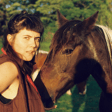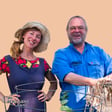
Cycles of Renewal with David Holmgren
David Holmgren is the co-originator of Permaculture, self-aware contrarian and contemplator of everything.
I’m lucky enough to be part of his extended household, so rather than shooting the breeze about the state of the world while sowing parsnips I figured I better bloody well get him on the podcast.
We dig into David’s own internal landscape as well as the contours of his life at Melliodora, and I was especially eager to quiz him about land sharing and housing alternatives; prime listening for those in the debt-avoidant club.
Listen out for our new Reskillience segment: Word Association – which sees me peppering David with all kinds of words and phrases to see what he’ll volley back. Such fun. And David said it’s unlike any interview he’s done before, which I’m taking as a good thing.
Permaculture principle #8 – Integrate rather than segregate
Edges talk given by David in Lisbon
Permaculture principle #11 – Use edges and value the marginal
David Holmgren’s collected essays
Essay ~ Pandemic brooding
Essay ~ Crash on Demand
Essay ~ The Apology
Book ~ The Golden Calm by M.M. Kaye
Call of the Reed Warbler ~ Charles Massey
RetroSuburbia Chapter #25: Changing Habits for Self-Reliance + Resilience
Book ~ RetroSuburbia: The Downshifter’s Guide to a Resilient Future ~ David Holmgren
eBook ~ Trees on the Treeless Plains ~ David Holmgren



















